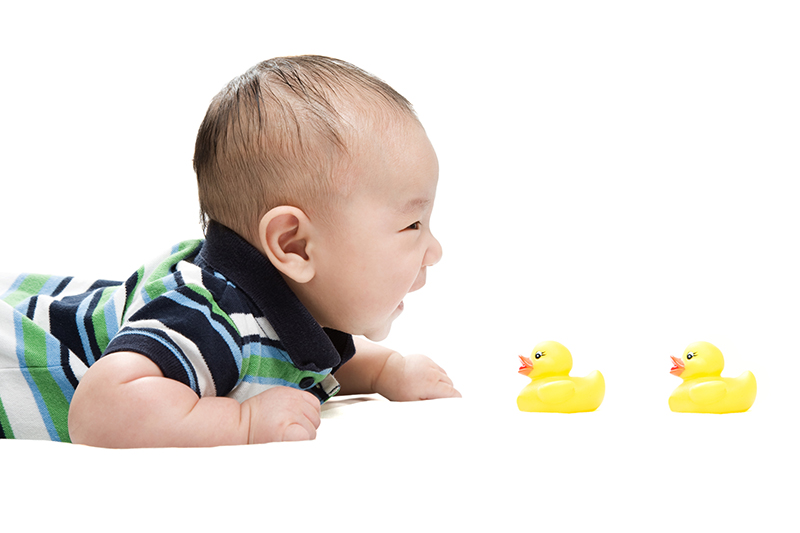Families For Life | Movement and Play for Babies

In their first 18 months, babies learn to lift their heads, roll over, sit, crawl, stand and walk. Play is the natural way that babies learn, and it’s one of the best ways to get your baby moving. Here are some play ideas.
Daily movement for babies: why it’s important
Playing with your baby and getting your baby moving are good activities for your baby’s development. So when you put play and movement together every day, you and your baby are off to a great start.
Play that gets your baby moving – for example, playing on the floor – helps your baby:
strengthen neck muscles to hold his head up and move it around
practise basic skills like reaching and grasping
build muscles for movements like rolling, crawling and pulling to stand – these movements help your baby learn to walk when he’s older.
The best toy for your baby is you. You’re the thing that interests your baby most. Playing and moving with your baby is a great way to connect with your baby. You can also give your little one lots of praise and encouragement as she learns more and more physical skills.
What to expect: babies and movement
Around this age, your baby is getting better at controlling his movements. For example, your baby will start reaching and grasping if you dangle a toy in front of him.
From about six months, your baby will start rolling or crawling. By then, you’ll need to look into making your home safe, in case she moves toward something dangerous.
The key moments in baby development generally happen in the same order, but when they happen might vary from child to child.
Tummy time
Tummy time is time your baby spends on his stomach while he’s awake. Doing tummy time from soon after birth helps your baby build neck, head and upper body strength to crawl and pull to stand when he’s older.
At first, your baby might not like tummy time – it might make your baby vomit or she might miss seeing you when she’s on her tummy.
If this sounds like your little one, try tummy time on your chest or across your lap. This puts less pressure on your baby’s tummy and can help with problems like reflux. This position also lets your baby see your face.
You could also get down on the floor with your baby. Let him know you’re there by singing, talking, stroking his back or tickling his hands. Try doing tummy time on a range of surfaces, like on carpet indoors or on a blanket outside.
You can start with short periods of tummy time, and build up to a several minutes as your baby gets used to it.
If your baby just doesn’t like tummy time or keeps being sick, it’s a good idea to see your paediatrician or General Practitioner (GP) for a check-up.
Play ideas to encourage movement
From 0-6 months, you could try the following ideas:
Encourage your baby to move to music and sound by making hand movements to songs, stories and rhymes, or by shaking rattles.
Give your baby different things to look at to help her get better at moving her eyes – for example, you can look at colourful books or pictures together, or blow bubbles or dangle objects in front of your baby’s eyes.
Babies aged 6-12 months might like the following activities:
Place toys just out of your baby’s reach to encourage reaching. You can also use simple toys like rattles to encourage touching and holding.
Give your baby wooden spoons to bang on pots and pans, or sealed containers with beads inside to shake.
Sit and support your baby upright on the floor, and move a ball or toy in front of him. This encourages your baby to follow it with his eyes, reach for it and grasp it.
Try push-and-pull toys like block wagons or carts.
Get your baby to try pulling to stand. You can sit her near furniture and encourage her to pull herself up to stand. Make sure that your furniture is sturdy and won’t fall over.
Make tunnels out of chairs or cardboard boxes for your baby to enjoy crawling and moving through.
These ideas are good for babies aged 12-18 months:
Try ride-on toys from 12 months.
Get your baby to put small containers into larger containers or turn the pages of a book to practise fine motor skills.
Sing songs that have simple actions for your baby to copy.
Let your baby experience different play spaces like swings, tunnels, ramps, slides – or even puddles!
Use toys or props that get your child throwing, kicking, running, jumping, dancing, digging or splashing.
Allow time for your baby to crawl or walk gradually longer distances, rather than always being strapped into a stroller.
The fun of play is that it can be noisy, messy and dirty! Your child can also get small bumps and bruises – but when you keep a close eye, he can have fun and stay safe while he plays.
Baby equipment and movement
Baby equipment like highchairs, car seats, strollers, jolly jumpers, cots and playpens are all useful, but they can restrict some of your baby’s movements. You might want to think about using them only when you really need them.
Baby playstations or activity centres are safer alternatives than baby walkers. Baby walkers can delay walking, crawling and the ability to sit without support. They can also cause injuries if babies move into dangerous areas without supervision, like near the oven, toilet, bath and stairs.
Downtime
Quiet, gentle activity is just as important for your baby’s development as play that encourages bigger movements. Downtime play can help babies develop fine motor skills – for example, putting pegs into a small bucket gives your baby practice at coordinating the small movements of her fingers with what she sees.
Reading and telling stories is a great quiet activity. Try books with pages covered in different fabrics – scratchy, soft and bumpy – to let your baby feel different textures. Scribbling on paper or listening to music are also good quiet activities.
The latest guidelines from the American Academy of Pediatrics suggest that children aged under 18 months should avoid screen time, other than video-chatting. Other play activities are much better for their development. Switching off your own tablet, phone and other screens and giving your baby your full attention will help all parts of your baby’s learning and development too.
© raisingchildren.net.au, translated and adapted with permission
Explore more

DID YOU KNOW?
Play is a great relationship builder. Spending time playing with your child sends a simple message – you are important to me. Help your child learn about who she is and where she fits in the world.
READ MORE